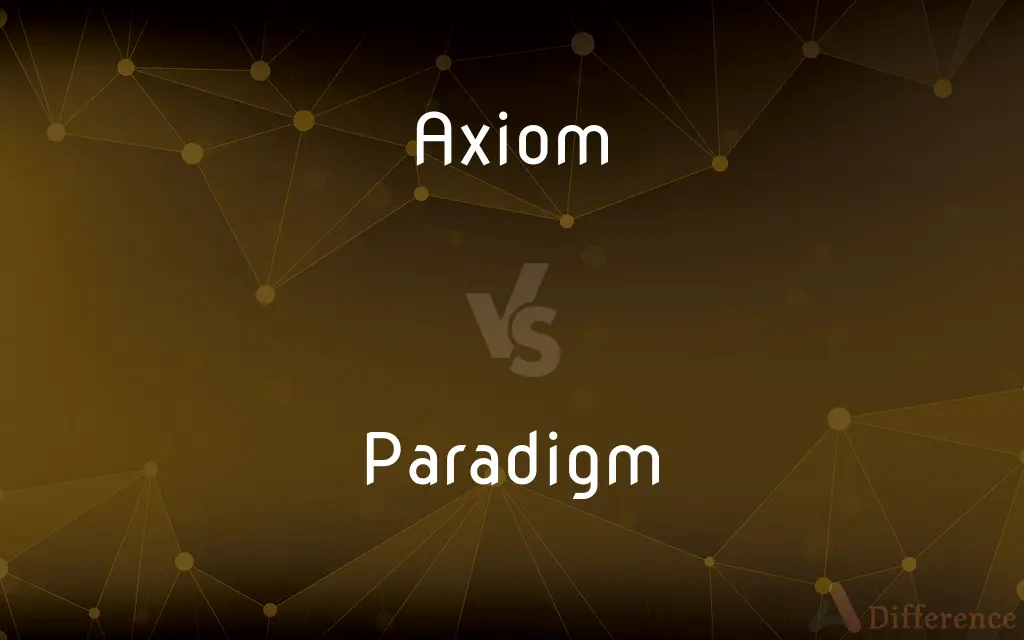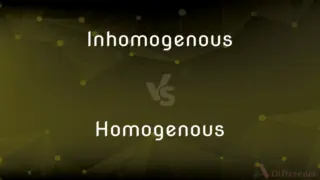Axiom vs. Paradigm — What's the Difference?

Difference Between Axiom and Paradigm
ADVERTISEMENT
Compare with Definitions
Axiom
An axiom, postulate or assumption is a statement that is taken to be true, to serve as a premise or starting point for further reasoning and arguments. The word comes from the Greek axíōma (ἀξίωμα) 'that which is thought worthy or fit' or 'that which commends itself as evident.'The term has subtle differences in definition when used in the context of different fields of study.
Paradigm
In science and philosophy, a paradigm () is a distinct set of concepts or thought patterns, including theories, research methods, postulates, and standards for what constitutes legitimate contributions to a field.
Axiom
A statement or proposition which is regarded as being established, accepted, or self-evidently true
The axiom that sport builds character
Paradigm
A typical example or pattern of something; a pattern or model
Society's paradigm of the ‘ideal woman’
Axiom
A self-evident or universally recognized truth; a maxim
“It is an economic axiom as old as the hills that goods and services can be paid for only with goods and services” (Albert Jay Nock).
ADVERTISEMENT
Paradigm
A set of linguistic items that form mutually exclusive choices in particular syntactic roles
English determiners form a paradigm: we can say ‘a book’ or ‘his book’ but not ‘a his book’
Axiom
An established rule, principle, or law.
Paradigm
(in the traditional grammar of Latin, Greek, and other inflected languages) a table of all the inflected forms of a particular verb, noun, or adjective, serving as a model for other words of the same conjugation or declension.
Axiom
A self-evident principle or one that is accepted as true without proof as the basis for argument; a postulate.
Paradigm
One that serves as a pattern or model.
Axiom
(philosophy) A seemingly self-evident or necessary truth which is based on assumption; a principle or proposition which cannot actually be proved or disproved.
Paradigm
A set or list of all the inflectional forms of a word or of one of its grammatical categories
The paradigm of an irregular verb.
Axiom
A fundamental assumption that serves as a basis for deduction of theorems; a postulate (sometimes distinguished from postulates as being universally applicable, whereas postulates are particular to a certain science or context).
Paradigm
A set of assumptions, concepts, values, and practices that constitutes a way of viewing reality for the community that shares them, especially in an intellectual discipline.
Axiom
An established principle in some artistic practice or science that is universally received.
The axioms of political economy cannot be considered absolute truths.
Paradigm
A pattern, a way of doing something, especially a pattern of thought, a system of beliefs, a conceptual framework.
Thomas Kuhn's landmark “The Structure of Scientific Revolutions” got people talking about paradigm shifts, to the point the word itself now suggests an incomplete or biased perspective.
Axiom
A self-evident and necessary truth, or a proposition whose truth is so evident as first sight that no reasoning or demonstration can make it plainer; a proposition which it is necessary to take for granted; as, "The whole is greater than a part;" "A thing can not, at the same time, be and not be."
Paradigm
An example serving as the model for such a pattern.
Axiom
An established principle in some art or science, which, though not a necessary truth, is universally received; as, the axioms of political economy.
Paradigm
(linguistics) A set of all forms which contain a common element, especially the set of all inflectional forms of a word or a particular grammatical category.
The paradigm of "to sing" is "sing, sang, sung". The verb "to ring" follows the same paradigm.
Axiom
A saying that widely accepted on its own merits
Paradigm
An example; a model; a pattern.
Axiom
(logic) a proposition that is not susceptible of proof or disproof; its truth is assumed to be self-evident
Paradigm
An example of a conjugation or declension, showing a word in all its different forms of inflection.
Paradigm
An illustration, as by a parable or fable.
Paradigm
A theory providing a unifying explanation for a set of phenomena in some field, which serves to suggest methods to test the theory and develop a fuller understanding of the topic, and which is considered useful until it is be replaced by a newer theory providing more accurate explanations or explanations for a wider range of phenomena.
Paradigm
Systematic arrangement of all the inflected forms of a word
Paradigm
A standard or typical example;
He is the prototype of good breeding
He provided America with an image of the good father
Paradigm
The class of all items that can be substituted into the same position (or slot) in a grammatical sentence (are in paradigmatic relation with one another)
Paradigm
The generally accepted perspective of a particular discipline at a given time;
He framed the problem within the psychoanalytic paradigm
Share Your Discovery

Previous Comparison
Kind vs. Shy
Next Comparison
Inhomogenous vs. Homogenous













































